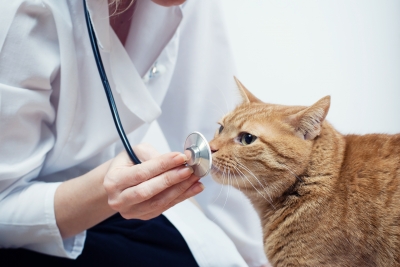Aging Pet's Last Day - Making The Right Choice

Take Control of the Process

Author's Background
I have many years of experience as the caretaker for three cats and one dog. I am not a vet or a pet psychologist, but have years of professional experience systematically solving problems in the legal and financial industries. Three years ago I was forced to make an end-of-life decision for my black American short-hair feline named Hershey, as he underwent exploratory surgery to find and remove cancer. His rescue-mate and brother named Snickers, will be 18 in June with all that age entails.
Happy to the End
As certain as life itself, a day approaches when circumstances will force you to say a final goodbye to a loyal pet. Every urge within you seeks an alternative. How can you live with your choice? How will your pet perceive your choice? The search for validation is often a quiet and lonely road.
Veterinarians and pet owners have written volumes about the tell-tale symptoms of a pet in pain or distress nearing the end of its journey. Far fewer words have been dedicated to providing a caretaker in turmoil with clear guidelines for making an end-of-life decision.
Most sources, cautioning against faulty diagnoses, advise the pet-owner to seek their veterinarian's advice. Vets play a key role in examination, treating symptoms, and administering euthanasia. Yet for many, the vet does not, cannot or will not resolve the troubling questions confronted by the pet-owner's heavy end-of-life decision. Regardless of trust or bedside manner, the perception that the vet represents a hastily assembled judge, jury and executioner with a financial stake, live or die, undermines her impartiality.
Caretakers should enter and exit the euthanasia decision confident in the independence, the timing and justification of their choice leaving no regrets. Decisions are rarely one-size-fits all. A thoughtful caretaker should implement a systematic decision process that can be contemplated, reviewed, and understood long before a decision is necessary.
If pet ownership is about maximizing the mutual happiness of both the owner and the pet, then "Happy to the End" should be the prevailing motto on the pet's last day.

Recommended Reading
Audio
Getting Your Mind Right
A pet's last days resemble a dreary fog in the caretaker's mind. Interrupted sleep, vet appointments, unsolicited opinions and advice from family or friends and the little devil of reason on one shoulder and the little angel of emotion on the other shoulder all contribute to the fog.
Google can help cut the fog or add to it. Several authors have written practical, objective and compassionate articles about the euthanasia decision. Links to these articles are in the margin. If you prefer to listen to an audio, Dr. Wendy McClelland and Greg Habstritt discussed Euthanasia on AM 770 in Calgary.
For those looking for direct, unvarnished, opinionated guidance and clarity, this hub is for you.
Borrowing a rule from airline safety, in case of deployment of the oxygen masks, secure your personal mask first. You can't help others if you are unconscious. Making the right decision for your pet and your family requires that you first get your own mind right.
Pet ownership comes with tremendous responsibility. Most caretakers realize that deciding to adopt means having a plan for sheltering, feeding, and maintaining indefinitely. The decision to adopt should also include careful thought and planning for the pet's last days. Your pet is counting on you to take ownership of this responsibility from day one. Failing to consider the welfare and best interest of the pet is simply not an option.
Questions and Concerns
- Do I Have to Decide?
- What About My Emotions?
- Should I Let Nature Take its Course?
- What if Expense is an Issue?
- Timing - Too Late or Too Soon?
- How Do I Avoid Regrets?
Do I Have to Decide?
Yes. And fortunately, yes.
Would you rather the vet decide? Or a poll of fellow readers? Or your neighbor? Or your mother?
First, if you care enough about your pet to agonize about the end-of-life decision, then accept the fact that you care enough to not delegate the most important decision of your pet's life. Your pet sees you as the hero, no matter what you decide. What a privilege. You get to decide!
Second, recognize that whether you decide to give your pet a peaceful end or let it soldier on, your decision amounts to a simple "thumbs up" or "thumbs down" that you already render every single day. For instance, if your pet was a rescue, you decided that living under your care was better than the alternative. With tongue in cheek, hopefully that was a good decision.
Third, be decisive. That does not mean be rash or reckless. The best way to be decisive is to map out your deciding process in advance, and then follow the process. Start by resolving to understand the health problem and the set of care or treatment options it presents. Contemplate and write down a set of rules that you will apply to those options. Then take a sheet of paper divided into three columns and table the known issues/options, the rule you established, and the outcome if the rule is applied.
For example, if your pet is diagnosed with 3 months-likely terminal but operable cancer, make a list of the known issues in the first column including surgery, medication, rehab tasks, recovery time, quality of life, etc. In the second column list your rules related to reasonable life expectancy, time limits for acceptable rehab, minimum standards for the pet's activities of daily living (ADLs) that can be performed without assistance, and your financial constraints. Finally, in the third column log whether or not resolving the issue clears the rule. If the result of the issue "Surgery" results in unacceptable, painful, life-long rehab, and cost-prohibitive medication, then Surgery violates your rule and should be dismissed. Ultimately, you will weigh the balance of those outcomes, and you may decide to give greater or lesser weight to particular issues and rules.
While this work may at first seem emotionally detached and cerebral, recognize that it is exactly that. The work represents your duty to your pet to make a good and reasonable decision. If you complete this exercise occasionally throughout your pet's life, even when healthy, you will have an easier time separating emotions from reason when the pet needs you most.

What About My Emotions?
Your emotions are an essential ingredient to your compassion. If you didn't care, exhibit love, or feel emotional pain, you were probably not a good candidate for pet ownership in the first place. When making end-of-life decisions for your pet, you should write down what you are feeling and place a scale number of 1-5 next to each emotion. Are you feeling most sad about the pet's pain and symptoms? Or most afraid about anticipation of loss? Or anger at the circumstances you desire to control?
Understanding your own emotions will help you place appropriate weight on the rules you established in the Deciding phase.
Keep in mind that your emotions have absolutely nothing to do with how your pet perceives you. Remember, you are the hero to your pet no matter what you decide. If it is agreed and non-negotiable from the beginning that both you and your pet must be "Happy to the End," then you will begin to appreciate the fact that your emotional need to avoid anticipation of loss will charge a price in extended pain for the pet. Of course your reluctance to extend the pet's pain will ensure its happiness when you choose instead to let it go.
When you look in the mirror, you realize that you will never be younger than you are today. Your emotional memory calls up an image of the younger you, but the present mirror image predominates, you accept it, and behave accordingly. Likewise, emotions are a mental reflection of events we experienced in the past when we were younger. You loved the purring cat sitting in the sunspot. But today, the cat no longer purrs due to pain. You accept it and move on, recognizing that the love of the purring cat is an emotion that lives on in your memory rather than your present reality. Emotions are like photo albums - vivid images of history but utterly blank to the future. Understanding the nature of emotion allows you to release your pet to your memories rather than trapping it unrealistically in your present.
When making an end-of-life decision for your pet, review as many photos of your pet as you can. Fill your mind with images of a strong and healthy pet. Then close the photos, look at your pet, and ask yourself whether its owes you more. I know. That is a very tough question to ask, possibly even mean. But is there a better way to put yourself in your pet's emotional shoes? Your eyes will not deceive you.
Should I Let Nature Take Its Course?
No. For two good reasons.
First, Nature is just another poor substitute for You. Remember, you get to decide! And your pet is counting on you, not Nature, not Lady Luck, not Father Time. Nature, Luck and Time are not sitting around writing a decision tree or laying on a couch contemplating their emotions.
Second, you took your pet out of nature's hands on adoption day. Left to nature, your pet would not likely have made it into your photo album.
When you think about it, there is not a more blessed pet world than the artificial environment you created. Your pet is sheltered, fed, tended to its entire life - not compelled to work, not forced to fight, scratch, claw, hunt and kill. And in the end, quite unnaturally, your pet is spared the experience of suffering the worst of its physical decline.
It is very hard to imagine a better way to treat a beloved family pet than to expeditiously welcome and celebrate its opportunity to be set free when you reasonably determine the time has come.
What if Expense is an Issue?
Expense is always an issue at some level. There is no need to run away from the reality. The fact is that it costs money to adopt, tend, treat and release a pet. It is also a fact that money is a fickle resource. Whether in short supply or abundance, the money spent on maintaining a pet is subject to competition. A pet's life, priced monetarily, is competing with other priorities at every stage.
One dollar spent on the pet is one dollar more than Nature affords.
Responsible caretakers will routinely make a budget, evaluate it according to priorities, and stick by it when difficult times arrive.
"Happy to the End" is a contract that suits the pet and the caretaker. Financial hardship and stress brought on by pet ownership violates the bargain and ultimately results in poorer options for the pet, regardless of the caretaker's priorities.
An aging pet and its owner may face the choice between expensive surgery, medication, and therapy versus euthanasia. If re-homing is not an option and the decision comes down strictly to lack of money, then the pet faces no greater jeopardy than a rescue pet faces on Day 1. Having lived happily in your home until it became ill was certainly better than the alternative.
Again, the pet perceives you as the hero, no matter what you decide.
Timing - Too Late or Too Soon?
Dr. Jennifer Coates writes for The Daily Vet at petMD,
My clients frequently tell me how worried they are that they might step in too early. To this I reply, "Better a week too early than an hour too late." I have seen what the "hour too late" looks like and would do anything to spare pets and their owners this level of suffering. In my 12 years of veterinary practice, I have never had a single owner tell me that they wished they had waited longer to euthanize, but countless people have said that they wished they would have stepped in sooner.
Concerns about timing usually have two underlying causes. First, the caretaker may not have completed the decision exercises in enough detail to understand the consequences of acting or failing to act. Second, there may be gaps in the facts necessary to make a confident decision. Veterinarians can advise you based on additional tests, but that information may not be complete. At that point, the choice is to move forward with less than perfect information, run more tests, or seek another Vet opinion.
Since more information often equates to more expense, the expense question may come back into play. But if expense is still acceptable in your budget, take the time to get all of your questions answered. Remember, your pet is relying on you and no one else. Be persistent and thorough.
Once you have the information you need, the concern about ending life too soon will likely be emotional and not about the facts.
How Do I Avoid Regrets?
Regret is an emotion. We feel regret when we make a decision that is contrary to our values.
When it comes to our pets, we cherish values such as loyalty, duty, responsibility, love and respect.
We protect our values by using reason guided by experience and emotion to make decisions. Our decisions should be the result of consistently applying our understanding of the facts to the rules and principles we adopted.
Regret and Loss are two different emotions. Loss is the pain we feel when something we treasure is taken away. The difference between the two is control. We can control whether our actions are consistent with our values. On the other hand, loss is a fact of life untethered from our values and actions.
We might lose the pet because we choose to euthanize, but not because we violated our values.
When you make the difficult decision to release your friend, engage your emotions and celebrate your pet's life by acting with confidence, clarity and without regret.
You will always be your pet's hero!





